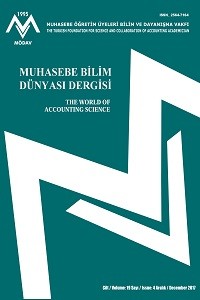Abstract
Bilişim teknolojileri ile gündeme gelen ve çok hacimli, çok hızlı ve çok çeşitli veri olarak tanımlanan Big Data, birçok alanla birlikte muhasebeyi de etkilemiştir. Big Datanın muhasebe eğitimi, muhasebe uygulamaları ve muhasebe mesleğini yakından etkileyeceği konusu son yıllarda muhasebe meslek örgütleri ve otoritelerinin gündemini oluşturmaktadır. Bu çalışmada Big Datanın tanımı, fırsatları, tehditleri, muhasebe uygulamaları ve muhasebe mesleğinde yaratacağı etkileri ortaya konulmuş ve Big Datanın gelecek 10 yıl içinde muhasebe mesleğine olacak etkisi ile ilgili, 790 muhasebe meslek mensubuna anket uygulanmış ve 740 adet anket değerlendirilmeye alınmıştır. Elde edilen sonuçlara göre, meslek mensuplarının Big Datanın gelecek 10 yıl içinde muhasebe mesleğine etkisi hakkında, kuşak, cinsiyet, mesleki deneyim, yaşanılan yer, mezun olunan fakülte ve çalışma biçimleri gibi demografik değişkenlere göre, farklı bakış açılarına sahip oldukları tespit edilmiştir.
Keywords
References
- Balcı, A. 2010. Sosyal Bilimlerde Araştırma, Yöntem, Teknik ve İlkeler, 8. Baskı. Ankara, Pegem Akademi. Cao, M. Chychyla, R. Stewart, T. 2015. ”Big Data Analiytics in Financial Statement Audits” Accounting Horizons, Vol:29, No:2. Ciğer, A. Kınay, B. Angı, G.G. 2017. “Büyük verinin Muhasebe Uygulamaları ve Muhasebe Eğitimi üzerindeki Etkileri”, 36. Muhasebe Eğitimi Sempozyumu Kitabı, Matsis Matbaa, İstanbul. Gürsakal, N. 2014. Büyük Veri, 2. Baskı, Bursa, Dora Yayınları. Hall, A. J. 2011. Accounting Information System, 7.Edition, USA, South-Western Cengage Learning. Kaya, İ., Ateş, S., Akbulut, D., Köksal. A. 2017. “Büyük veri, Veri Analitiği ve Veri Analizi Işığında Muhasebe Eğitimi: Ders İçerikleri Üzerine Bir Araştırma”, 36. Muhasebe Eğitimi Sempozyumu Kitabı, Matsis Matbaa, İstanbul. Rainer R. K. ve Cegielski, Jr. C. 2011. Introduction Information System, 3. Edition, USA, John Wiley & Sons, Inc. Spiegel. E. 2014. “Six Challenges of Big Data, The Wall Street Journal”, March 26. Tarhan, U. 2016. ” Mesleklerin Gelecek Haritası” BrandMAP, Şubat. Vasarhelyi, M.A. Kogan, A. Tuttle B. M. 2015. “Big Data in Accounting: An Overview”, Accounting Horizons American Accounting Association, Vol. 29, No. 2. Yarow, J. 2014. “These Are The Jobs That Will Be Safe From The Imminent Invasion Of Robots”, Businessinsider.com, Jan 23. Warren J.D. Moffit Jr.K. ve P. Byrnes. 2015. “How Big Data Will Change Accounting”, Accounting Horizons, Vol.29, No :2.
Abstract
Big Data, which is defined as very high volume, very velocity and wide variety of data and coming up with information technologies, is closely related to many fields and sectors. Another field under the influence of Big Data is the accounting. The subject that Big Data will closely affect the accounting education, accounting practices and accounting profession is the agenda of professional accounting organizations and authorities in recent years. In this study, the definition of Big Data, opportunities, challenges, accounting practices and its effects on accounting profession are revealed. According to thedemographic factors, the perspectives of professional accountants operating in our country have been determined through a questionnaire about the impact of Big Data on accounting profession in next 10 years. The questionnaire was applied to 790 professional accountants and 740 valid questionnaires were taken into consideration. According to the results, accounting profession have different views about the effects of the BIG DATA on accounting profession over the next 10 years according to the demographic variables such as generation, gender, professional experience, place of residence, graduated faculty and working styles.
Keywords
References
- Balcı, A. 2010. Sosyal Bilimlerde Araştırma, Yöntem, Teknik ve İlkeler, 8. Baskı. Ankara, Pegem Akademi. Cao, M. Chychyla, R. Stewart, T. 2015. ”Big Data Analiytics in Financial Statement Audits” Accounting Horizons, Vol:29, No:2. Ciğer, A. Kınay, B. Angı, G.G. 2017. “Büyük verinin Muhasebe Uygulamaları ve Muhasebe Eğitimi üzerindeki Etkileri”, 36. Muhasebe Eğitimi Sempozyumu Kitabı, Matsis Matbaa, İstanbul. Gürsakal, N. 2014. Büyük Veri, 2. Baskı, Bursa, Dora Yayınları. Hall, A. J. 2011. Accounting Information System, 7.Edition, USA, South-Western Cengage Learning. Kaya, İ., Ateş, S., Akbulut, D., Köksal. A. 2017. “Büyük veri, Veri Analitiği ve Veri Analizi Işığında Muhasebe Eğitimi: Ders İçerikleri Üzerine Bir Araştırma”, 36. Muhasebe Eğitimi Sempozyumu Kitabı, Matsis Matbaa, İstanbul. Rainer R. K. ve Cegielski, Jr. C. 2011. Introduction Information System, 3. Edition, USA, John Wiley & Sons, Inc. Spiegel. E. 2014. “Six Challenges of Big Data, The Wall Street Journal”, March 26. Tarhan, U. 2016. ” Mesleklerin Gelecek Haritası” BrandMAP, Şubat. Vasarhelyi, M.A. Kogan, A. Tuttle B. M. 2015. “Big Data in Accounting: An Overview”, Accounting Horizons American Accounting Association, Vol. 29, No. 2. Yarow, J. 2014. “These Are The Jobs That Will Be Safe From The Imminent Invasion Of Robots”, Businessinsider.com, Jan 23. Warren J.D. Moffit Jr.K. ve P. Byrnes. 2015. “How Big Data Will Change Accounting”, Accounting Horizons, Vol.29, No :2.
Details
| Subjects | Business Administration |
|---|---|
| Journal Section | MAIN SECTION |
| Authors | |
| Publication Date | December 21, 2017 |
| Submission Date | July 27, 2017 |
| Published in Issue | Year 2017 Volume: 19 Issue: 4 |
Authorship
MBDD follows the guidelines in COPE Authorship Guideline to ensure fair recognition of contributions to a research paper (https://publicationethics.org/guidance/discussion-document/authorship ). Authorship carries both credit and responsibility, and it is essential that all listed authors have made significant contributions to the research.
For multi-author studies, the Contributions of Authors must be declared after the conclusion and before the bibliography of the paper. The authors' initials and last names should be used to indicate which author contributed to which part of the manuscript. Details can be found by clicking the “Article Submission Checklist” button. The authors can acknowledge contributions that do not merit authorship.
The author(s) should disclose the use of generative Artificial Intelligence (AI) and AI-assisted tools in design and implementation of the research. Such use need to be disclosed within the methodology section of the manuscript. Use of AI does not preclude the manuscript from publication, rather provides a transparent picture of the research.


